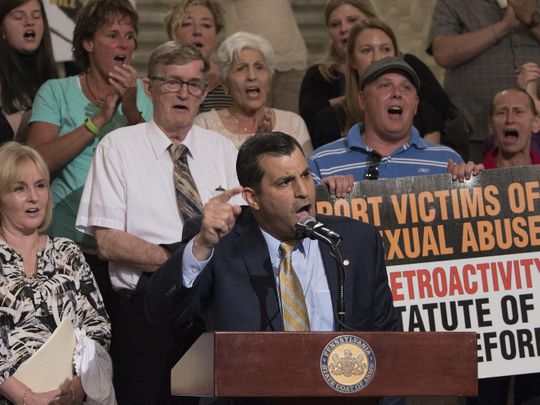Catholic Church Lobbying in Pa. Spiked after Damaging Investigations
By Logan Hullinger
The Catholic Church has spent millions influencing Pennsylvania politics, but the funds perhaps have been the most useful amid reports uncovering widespread child sexual abuse and attempts to cover it up. That money is again coming into play as two bills raising the statute of limitations on child sexual crimes and opening a two-year retroactive window for victims to file lawsuits once again head to the state Senate. “(The expenditures) speak to the very issue of protecting their institutional reputation, which is one of the significant causes of this sex abuse crisis to begin with," said Zach Hiner, executive director of the Survivors Network of those Abused by Priests. There have been three grand jury investigations in the past decade that have revealed thousands of child sexual abuse cases by Pennsylvanian Catholic priests and attempts to hide them, all of which were welcomed by significant increases in spending on lobbying by the church. The Pennsylvania Catholic Conference (PCC), the lobbying arm for the church in Pennsylvania, has spent $7.2 million in lobbying since 2007, according to state Department of State data. Lobbying expenditures increased from $529,000 to $786,000 following the release of the 2011 Philadelphia grand jury report, the largest increase in the conference's history and the most it ever spent in a year. Beginning in 2016, expenditures would then increase for three years in a row for the first time. That year, the state Attorney General's six-diocese investigation began and a separate investigation into the Roman Catholic Diocese of Altoona-Johnstown concluded. PCC spokesman Al Gnoza said he could only speculate as to why there were surges in lobbying expenditures as he's only been at the organization since 2018. "I've not seen any changes (in lobbying), and we still lobby on the same amount of issues," Gnoza said. "We haven't hired anybody else internally or as a subcontractor. I have no seen an uptick." Yet advocates and legislators say they are well aware of the church's lobbying tactics. "(The lobbying) shows the ignorance that they think they're above the law, and the more money they spend, the more return it's going to give them," said Rep. Mark Rozzi, D- Berks. "It's disgusting. It seems like protecting an institution is more important than protecting children." Rozzi, who was raped by a priest as a teenager, has been pushing for legislative action for years. The upper chamber is expected to soon weigh his proposal that would eliminate the criminal statute of limitations on sex crimes going forward and raise the civil statute of limitations, meaning victims could file civil lawsuits, until they were 55 years-old. The bill accompanies a constitutional amendment proposed by Rep. Jim Gregory, R-Blair, who was sexually abused as a child. That would create a two-year retroactive window for those who have been timed out of the court system and want to sue sexual abusers or the institution of which they're a part. The two bills were conjoined last session — although the two-year window was a statutory measure — and Senate Republicans blocked the bill. They're now separate, but a clause in Rozzi's bill states it cannot take effect until Gregory's passes both chambers. The PCC spent more than $777,000 in 2018 alone, the second most it's spent in a year, according to data dating back to 2007. While the lawmakers hope they'll have more success this time around, the Catholic Church's finances are still front and center, especially since survivors don't have the luxury of a strong lobbying arm. Yet the church has said it's remaining neutral on the bills, despite its lobbying increases. "We're not opposing either (bill)," Gnoza said. "We're taking more of a monitored stance on it. I think we all want the victims made whole and taken care of. We just have different views of how that's going to happen." The church has instead promoted compensation funds for victims who may have been timed out of the court system or don't file a lawsuit. Senate President Pro Tempore Joe Scarnati, R-Jefferson, supports the funds. Scarnati, who didn't respond to multiple inquiries for comment, has said the two-year retroactive window legislation is unconstitutional. Attorney General Josh Shapiro and supporters have disputed that claim. Yet the church isn't the only entity siding with Senate Republicans over the two-year window proposal. The insurance industry is on board as well. The insurance industry — which has given Scarnati about $675,000 since he took office in 2001, more than any other legislator — opposes creating retroactive liability without a retroactive premium. "We realize concerns about insurance economics and mandating insurance coverage without allowing for premiums to pay for that coverage are secondary for many, but they are important concerns in assuring the fiscal soundness of our industry," said Sam Marshall, CEO of the Insurance Federation of Pennsylvania. The federation fully supports victims of child sex abuse, and it has pushed for a compensation pool rather than a two-year window, he added. Although insurance industry lobbying has largely leveled off since a spike in 2013, the federation's lobbying expenditures in 2018 were the largest on record at $1.95 million. Those increases have continued through Rozzi's proposals for a two-year window, but Marshall said there is no correlation to make there — a sentiment Rozzi and others reject. "We represent a wide number of companies, most of whom have no liability exposure on this issue," Marshall said, adding areas that receive most of the money are auto insurance, medical malpractice, workers' compensation and others.
|
.
Any original material on these pages is copyright © BishopAccountability.org 2004. Reproduce freely with attribution.
